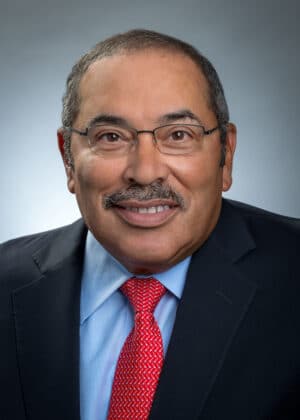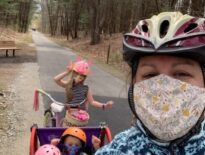Ronald Homer
Chief Strategist, Impact Investing, RBC Global Asset Management
Age: 74
Industry experience: 51 years
When Ronald Homer started looking for a job after finishing business school, he wanted to work for a company where he could help expand economic opportunities in underserved areas. But this had not been his original career goal. Homer had planned to go to medical school after graduating from the University of Notre Dame in 1968. Then a meeting with Robert F. Kennedy during his senior year changed the course of his career, eventually leading to his work in economic development.
After a bank president hired him so he could learn the banking industry, Homer found opportunities to work in Black communities, first at Freedom National Bank, the Harlem-based lender founded by Jackie Robinson. He then came to Boston to become CEO and principal shareholder for 13 years at the Boston Bank of Commerce, a predecessor of today’s OneUnited Bank. Homer then got involved with impact investing by founding Access Capital Strategies, now part of RBC Global Asset Management.
Q: How did you get started in your career?
A: Two months before I graduated from Notre Dame, my former roommate, who was also African American, got involved in Bobby Kennedy’s presidential campaign. He asked me if I wouldn’t mind riding in the motorcade that was going from the airport to Notre Dame where Bobby Kennedy was going to make a speech. They wanted a young African American to be in the motorcade.
I didn’t realize I would actually ride in the car with Ethel and Bobby and the mayor of South Bend, but that’s what happened. Back then you still had convertibles with the top down and people could run up to the car. The empathy, the compassion, the hope, the enthusiasm of the crowds as we passed through – both Black and white, poor Black and poor white – there was a feeling that he could really make a difference in their lives.
By the end of the day, I was awestruck and impressed and convinced if he became president, I would join his team and help contribute to doing that. It turned out that was the same day that Martin Luther King [Jr.] was assassinated, and two months later, just before I was going to graduate, Bobby Kennedy was assassinated.
After graduating from college, I spent a year trying to further the work of Bobby Kennedy and Martin Luther King through social work and community services. That one year’s experience taught me that at the heart of a lot of the social issues and disparities were economic and income disparities, and that social work was not going to create economic opportunities.
Q: Why did you start Access Capital Strategies?
A: After the Community Reinvestment Act was passed and then expanded, it became clear that larger banks and larger institutions like Fannie Mae were all going to be pushed to do a better job serving these communities. I was convinced that instead of trying to take a small bank to solve all these problems, I’d be better off creating a vehicle that could work with all these larger institutions, because they had more capital, more resources, more ability to experiment, more of everything. But what they didn’t have was the experience, and maybe the understanding.
I formed Access Capital Strategies with seed capital from Fannie Mae, Peter Lynch, Michael Porter [founder of the Initiative for a Competitive Inner City] and three other minority banks. We operated independently and had Merrill Lynch as a subadviser. When Merrill Lynch merged with BlackRock, they were going to get too big, so we hired RBC as a subadviser. They said, “We like this strategy, but we’d like to own it. We could put more money into it. We can help you grow.” I bought into that and sold the business to RBC.
Q: What is your role at RBC?
A: My title is chief strategist, impact investing. I work with our investment teams, our client servicing teams, and our marketing teams to identify a product or capabilities within our investments that address a certain targeted societal problem. Right now, our focus has been on climate change and racial disparities.
Q: How does impact investing work?
A: What our team is trying to do is to create a bridge. We use government loan programs as a way to distribute capital into the community in a safe way and in a way that for the investor is liquid. We think that finding ways that businesses and people can make safe investments that support basic structural issues is key. Our impact strategies are designed to do that – to make money as well as to have impact. We’re hopeful that this new concern and spotlight on racial disparities will create some opportunities for that to happen, with or without us.
Q: What can the banking industry do to have an impact?
A: One of the challenges in Boston and other communities is how do we create an environment and the opportunity for capital to flow in support of basic things like home ownership, essential services, decent housing and small business development. One of the things we’re trying to do is to create pools of capital that are specifically targeted to making those investments in the most underserved areas. The second step is to educate the community on how to get that capital. In some cases, communities don’t have a history on how to receive and how to compete for capital. Not that they’re incapable – they just haven’t had a tradition of doing that.
Q: From what you’ve seen in the last year, do you think progress can be made?
A: I think there’s a heightened awareness that there are these structural disparities. I think the civil unrest after the police killings, the potential for that to escalate and the broad support has awakened more enlightened interest that there may be a business opportunity here, but also that we can’t afford to have disruptions and political undercurrents interrupt our business.
I don’t think over the long term that structural disadvantage is sustainable in a democratic society. The cost of maintaining that structure over the long haul, I think, will far outweigh the cost of addressing the issue.
Homer’s Five Favorite Non-Golfing Vacation Spots
- Tanzania, Zanzibar and the Serengeti
- Shanghai, China
- Israel
- Italy
- Haiti







